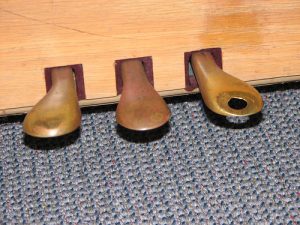Chances are pretty good that you’ve either taken piano lessons yourself or you’ve known someone who has. But are piano lessons really all they’re cracked up to be? I may be a bit biased, but the answer is most definitely YES!!! Piano lessons can be an incredible experience that will not only teach you a new skill but will enrich your life in many ways.
You’ve probably heard that learning music is good for you. It’s why things like Baby Einstein’s “Baby Mozart” exist. Exposing children to music at a young age has been proven to improve creativity and brain function. Many scientific studies have demonstrated a link between music education and academic achievement.
But why piano? What is so special about the piano?
Stop for a moment and think about all that goes into playing the piano. The piano has 88 keys and 3 pedals, and a pianist can identify every one of them. A pianist can read two lines of music at the same time. Each line may have up to 4 or 5 (or more!) notes to read and play, once again at the same time. There are also words and markings around and in the lines of music for a pianist to read. On top of reading and understanding all these things, a pianist can play them. Pianists can play each finger independently and in specific combinations on both hands. A pianist’s brain reads what is on the page and tells which fingers on which hand to play which keys. A pianist plays each note or set of notes in a certain style and for a certain amount of time, which the pianist knows based on reading the music. Additionally, a pianist may use one or both feet to play the piano pedals. Usually pianists just use their right foot on the damper pedal, and this foot is used independently of the hands and fingers. On top of all this, a pianist is constantly listening to himself while playing so that at all times, he is aware of how the music sounds and is being presented. There is a mathematical and technical side and a creative and expressive side to playing piano, requiring the use of both sides of the brain. Fingers, hands, feet, ears, eyes, hand-eye coordination, right and left brain working together…

When you break it down like that, it is clear that playing the piano is a monumental task. The brain controls and organizes many independent actions simultaneously to create a single piece of music. But the most remarkable thing about this is that it is possible! The human mind and body is capable of astounding things. Even those who do not have much natural talent will still develop valuable skills for both the mind and body.
Permanent Benefits of Piano Lessons
One study by MIT showed that on average, concert pianists have a 30 percent larger cerebral cortex than intellectuals who have not had music education. Similar studies have shown how studying music enhances memory, confidence, coordination, discipline, patience, perseverance, determination, creativity, IQ, and even hearing and sight. Music lessons have been proven to improve concentration skills, problem solving skills, emotional skills, performance skills, and overall brain function. What’s even better is that these benefits are PERMANENT.
(I’d like to point out that these benefits are not just for children. I teach adults, too. The piano can be an educational tool for everyone, and all can maintain and gain great benefits.)
I teach piano lessons in Corona, CA and Online. I teach my students everything from technique and music theory to style, ear training, improvisation, and more. If you’ve never thought seriously about putting yourself or your child in piano lessons, now is a great time to start. To schedule piano lessons with me, fill out my online form or call me at (951) 314-3593.


